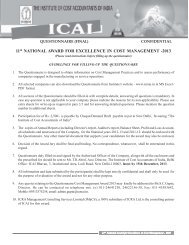This Issue - Icwai
This Issue - Icwai
This Issue - Icwai
Create successful ePaper yourself
Turn your PDF publications into a flip-book with our unique Google optimized e-Paper software.
LEGAL LEGAL EDUCATION<br />
EDUCATION<br />
will be the basis for identifying lawyers for various<br />
roles and appointments including law officers and<br />
judges.<br />
4. The Indian Law Institute to refocus on its core<br />
mission to promote research in law as well as conduct<br />
postgraduate specialist courses in various fields of law<br />
by recruiting faculty of global standard.<br />
5. The Delivery of Justice and Law Reform Trust<br />
of India—in collaboration with the bar, the bench and<br />
leading business schools in India—will develop<br />
courses for court administrators and managers.<br />
6. We will develop a system to create a cadre of<br />
paralegals in various sectors of legal practise who may<br />
then serve as legal secretaries and strengthen legal<br />
aid and literacy programs.<br />
A comprehensive strategy that encapsulates both<br />
“Top to Bottom” and “Bottom to Top” approaches<br />
will see lawyers at all levels participating in continuing<br />
legal education programs. We will demonstrate that<br />
the Indian legal and justice system is efficient,<br />
responsive, globally competitive, quick and orderly,<br />
with judges and lawyers who can rise up to global<br />
challenges and the future needs of the country.<br />
The way forward<br />
As early as 1917, when serious initiatives were<br />
taken to reform legal education at the Yale Law School,<br />
it was noted that the purpose of the law school should<br />
be “the study of law and its evolution—historically,<br />
comparatively, analytically, and critically—with the<br />
purpose of directing its development in the future,<br />
improving its administration and on perfecting its<br />
methods of legislation”.<br />
The central question we need to ask ourselves in<br />
India is whether our law schools are fulfilling this<br />
responsibility adequately, and if not, what we need<br />
to do, so that we are able to address the fundamental<br />
issues concerning legal education that were raised<br />
over 90 years ago in the United States. Legal education<br />
reforms in India should go along with the<br />
encouragement of global philanthropic initiatives, so<br />
that resources are available to maintain international<br />
standards to impart quality education and conduct<br />
impact-oriented research.<br />
Barring Foreign Law Firms from practsing in India<br />
as was held in Lawyers Collective vs Bar Council of<br />
India and others by the Bombay High Court is not a<br />
solution, as the judgment will be having its own<br />
ramifications in the global sphere for the legal<br />
practitioners from India who want to take up legal<br />
practice outside India. It is now imminent for the<br />
Central Government/Bar Council to legislate and<br />
frame appropriate rules in consultation with all the<br />
stakeholders, with regard to entry of foreign law firms<br />
in India and to arrive at a judicious decision to put to<br />
rest the threat being posed by the foreign law firms.<br />
Instead of wasting of time and energies on whether<br />
legal education in India is to be liberated from the<br />
dominant control of the Bar Councils or over<br />
superseding of regulatory bodies (it is immaterial<br />
whether it is Law Ministry’s domain or HRD<br />
Ministry’s) under a proposed super-regulatory<br />
authority as suggested by the National Knowledge<br />
Commission and the Yashpal Committee, let us<br />
concentrate our focus and energies to convert the new<br />
challenges into opportunities in the global arena.<br />
<strong>Issue</strong>s to be addressed to meet the Global<br />
challenges<br />
1. Curriculum and teaching<br />
The new and emerging law schools cannot afford<br />
to limit their focus to teaching and research on issues<br />
relating to Indian law. In fact, the appetite of Indian law<br />
students for understanding international and<br />
comparative law has significantly increased over the<br />
years, given their participation in international moot<br />
competitions that range from issues such as maritime<br />
law to humanitarian law to dispute resolution. The<br />
most challenging task is to strike a proper balance to<br />
ensure that students are taught a fair mix of courses that<br />
give them knowledge and training in Indian law, but,<br />
at the same time, prepare them for facing the challenges<br />
of globalisation, whereby domestic legal mechanisms<br />
interact with both international and foreign legal<br />
systems. <strong>This</strong> interaction is going to deepen in the years<br />
to come and our law schools must prepare themselves<br />
to face this challenge posed by globalisation.<br />
2. Knowledge and faculty research<br />
Hiring of good faculty has been a challenge in law<br />
schools in India and abroad. There is a need to have a<br />
global focus in hiring faculty for Indian law schools.<br />
Of course success will depend on the school’s ability<br />
to provide the right kind of intellectual environment<br />
and financial and other incentives for Indian or foreign<br />
scholars to teach and pursue research in India and to<br />
contribute to its growth story.<br />
Globalisation of legal research has become a<br />
universal trend. Legal scholars working in a particular<br />
country or researching on the law and legal systems<br />
of that country do not limit their research to that<br />
country or its neighbours. With the development of<br />
web-based research and other online research tools<br />
and databases, there has been a remarkable<br />
transformation in the development of comparative<br />
and international law research. It is important for<br />
global law schools to have or provide access to legal<br />
material from jurisdictions all over the world. These<br />
need to be constantly updated to keep up with the<br />
changing dimensions of law in all societies. There is<br />
798 The Management Accountant |September 2011




